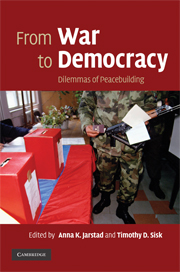Book contents
- Frontmatter
- Contents
- List of tables
- About the authors
- List of acronyms
- Acknowledgments
- Introduction
- Part I The perils of war-to-democracy transitions
- Part II The security context
- Part III The political process
- 4 Power sharing: former enemies in joint government
- 5 When rebels change their stripes: armed insurgents in post-war politics
- 6 Post-war elections: uncertain turning points of transition
- 7 Civil society in war-to-democracy transitions
- Part IV International engagement
- References
- Index
4 - Power sharing: former enemies in joint government
Published online by Cambridge University Press: 14 May 2010
- Frontmatter
- Contents
- List of tables
- About the authors
- List of acronyms
- Acknowledgments
- Introduction
- Part I The perils of war-to-democracy transitions
- Part II The security context
- Part III The political process
- 4 Power sharing: former enemies in joint government
- 5 When rebels change their stripes: armed insurgents in post-war politics
- 6 Post-war elections: uncertain turning points of transition
- 7 Civil society in war-to-democracy transitions
- Part IV International engagement
- References
- Index
Summary
More than a decade after the peace agreement for Bosnia and Herzegovina was signed in Dayton, Ohio, the country remains divided. The peace agreement served its main aim – to end the 1992–1995 conflict – but its power-sharing provisions are now seen as an obstacle to peacebuilding and democratization. The political representatives of the three main ethnic groups have not managed to govern jointly. Instead, the international community's High Representative has imposed laws and removed several politicians from office. For the sake of efficacy, these measures have substituted normal procedures for accountability and democratic legitimacy. The extensive external control has undermined local ownership. Furthermore, the political system provides no incentives to form cross-ethnic and moderate political parties. The international community has therefore suggested a need for constitutional changes. The pertinent issues include the tripartite presidency and decentralization to the two entities, the Bosniak-Croat Federation and Republika Srpska. Revisions toward an integrated, centralized non-ethnic parliamentary democracy with a single president have been proposed. However, these changes upset the power balance that has regulated the conflict. Removing guaranteed governmental position threatens the power of the present elite. Hence, Serbian leaders want to maintain Republika Srpska, and many Croats believe that they should also get their own entity. In April 2006 the parliament voted against constitutional changes. The case raises pertinent questions about governance in post-war societies. In what ways does power sharing facilitate, or obstruct, the transition of divided societies toward a secure democracy?
- Type
- Chapter
- Information
- From War to DemocracyDilemmas of Peacebuilding, pp. 105 - 133Publisher: Cambridge University PressPrint publication year: 2008
- 25
- Cited by



